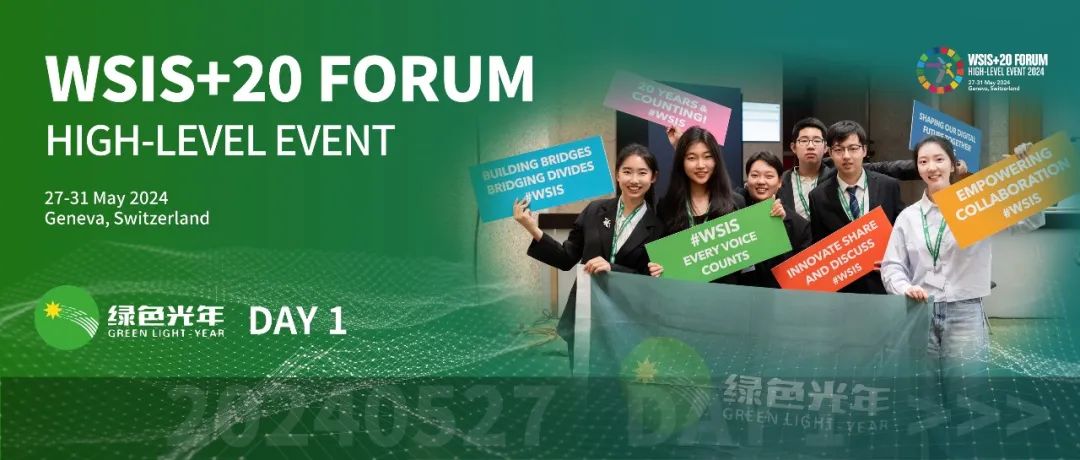
The World Summit on the Information Society (WSIS) is a two-phase United Nations (UN) summit, first introduced by Tunisia in 1998. The summit aims to create an evolving multi-stakeholder platform to address issues raised by information and communication technologies (ICTs) at the national, regional, and international levels. The goal is to build a people-centric, inclusive, and development-oriented Information Society where everyone can create, access, utilize, and share information.
The WSIS Forum is an annual multistakeholder event within the WSIS process. The forum is hosted annually by the ITU and co-organized by several UN organizations. The WSIS Forum’s process aligns with that of the SDGs. The forum’s program is collaboratively curated through crowdsourcing, promoting extensive ownership and facilitating continual improvements. The WSIS Forum in 2024, branded as WSIS+20 Forum High-Level Event 2024, will take place on 27-31 May 2024 in Geneva, Switzerland, and will serve as a platform to provide multistakeholder discussions and to take stock of the achievements and key trends, challenges and opportunities since the Geneva Plan of Action in 2003.
The Green Light-Year Youth Delegation arrived in Geneva on May 25. This article shares insights from the first day of the GLY Youth Delegation’s participation in the conference.
Featured Photos


Wenzu Gong
Team leader
Digital SDGs Needs Multistakerholders’ Cooperation
In the increasingly digital age, technology permeates every facet of our lives, offering unparalleled opportunities for progress and development. However, the uneven distribution of digital resources and the potential misuse of digital technologies pose significant challenges. The Global Digital Compact (1 April 2024), which aims to achieve the Sustainable Development Goals (SDGs), emphasizes the need for inclusive, open, safe, and secure digital governance. For these goals to be realized, genuine multistakeholder cooperation is paramount. Through observing WSIS Team’s work mode and WSIS Process, I want to explore the vital role of multistakeholder cooperation in achieving digital SDGs and emphasizes the need for a global collaborative approach.
The Promise and Pitfalls of Digital Technologies
Digital technologies offer vast potential to advance human wellbeing, address societal challenges, and foster sustainable development. They are instrumental in facilitating education, healthcare, economic growth, and environmental sustainability. According to the Global Digital Compact, digital technologies “hold out the promise of achieving the Sustainable Development Goals,” by bridging gaps and connecting remote and underserved communities to the global economy.
However, the advantages of digital technologies come with inherent risks. Issues such as data privacy, cybersecurity threats, digital divides, and the environmental impact of technology must be addressed. Misuse of digital technology can exacerbate inequality, infringe on human rights, and lead to social and political unrest. Therefore, achieving the potential benefits of digitalization while mitigating its drawbacks necessitates a comprehensive and collaborative governance framework.
Importance of Multistakeholder Cooperation
Multistakeholder cooperation involves the joint efforts of governments, the private sector, civil society, international organizations, and the technical and academic communities. Such collaboration ensures that diverse perspectives are considered, promoting inclusive and equitable digital development. The Global Digital Compact outlines several principles guiding digital cooperation, emphasizing the need for participatory, transparent, and accountable governance.
Inclusive and Equitable Participation: The equitable participation of all stakeholders is crucial. Governments, private companies, and civil society must work together to create policies that bridge digital divides and promote inclusivity. The Compact stresses that “our cooperation will close the digital divides within and between states and advance a digital environment that promotes and enables diversity.”
Development-Focused Approach: A development-focused approach prioritizes digital initiatives that support sustainable development. Multistakeholder cooperation can align resources and expertise towards projects that have a tangible impact on development goals, such as digital literacy programs, infrastructure development, and inclusive digital economies.
Accountability and Transparency: Accountability and transparency in the design, development, and deployment of digital technologies ensure that they are used responsibly and ethically. Multistakeholder forums provide a platform for stakeholders to hold each other accountable, promoting transparent decision-making processes.
The Role of the WSIS Process – Coordinating all digital actors
The World Summit on the Information Society (WSIS) process plays a pivotal role in fostering global digital cooperation. Initiated by the International Telecommunication Union (ITU), the WSIS facilitates dialogues among stakeholders to address emerging digital issues and promote inclusive digital development. The WSIS Governance Process report underscores the importance of multistakeholder engagement in shaping digital policies and practices.
In the WSIS+20 exhibition, various stakeholders including UN Brief, DiploFoundation, Globethics, Shanghai Green Light-Year, Iran University of Science and Technology, Parallax Futures, and The OneGoal Initiative for Governance (OGI), ZTE, UAE Government shared their work on digital SDGs. This broad participation highlights the importance of incorporating diverse insights and expertise into the governance framework to address the multifaceted challenges posed by digital technologies.
When the WSIS+20 conference concludes, all the organizers will submit an outcome. Once all these outcomes are integrated into a landmark document, I hope that it will serve as a guiding framework for different types of actors to enhance cooperation, promote the application of digital products, and visualize the Sustainable Development Goals.
About Global Digital Impact: Zero Draft:
https://www.un.org/techenvoy/sites/www.un.org.techenvoy/files/Global_Digital_Compact_Zero_Draft.pdf
About WSIS Governance:
https://www.itu.int/net/wsis/review/inc/docs/plus20/WSISGovernance.pdf

Jiazhou Ni
Vice team leader
The WSIS+20 opening ceremony was held at Center international conference, Geneva (CICG), marking the official commencement of the World Summit on the Information Society. Numerous opinions and data were presented at the venue, to be listened to, read, and analyzed by the attendees, bringing forth new ideas.
To ensure that information technology benefits everyone worldwide, WSIS has made significant efforts over its 20-year history to reduce technical barriers and gradually cover the last remaining segments of the population. The World Summit on the Information Society is a United Nations process that involves all stakeholders. Through WSIS, the United Nations promotes dialogue, partnerships, and inclusive policies to bridge the digital divide and ensure no one is left behind. Here, in a vibrant atmosphere of innovation, discourse transcends mere rhetoric; it becomes a catalyst for transformation.
The CICG venue provided a highly open and inclusive platform, with content in the spotlight and in the exhibition area being rich, vibrant, and interconnected. Through communication with other exhibitors, we learned new methods of introducing materials and felt everyone’s efforts towards WSIS’s work from the overall to the individual levels—from policy support to urban construction, multimedia platforms for the visually impaired, children’s reading materials, and databases created for local languages. In the following days, we will discuss the implementation outcomes of the action lines from more detailed perspectives and analyze future challenges, aiming to make progress amidst rapid development.

Kefei Chen
Team member
At the conference themed “International Standards: a commitment to inclusivity,” Mr. Meetzger’s response, Philippe Meetzger, Secretary-General and CEO of the International Electrotechnical Commission (IEC), on how international digital inclusion standards address sustainable development challenges left a deep impression on me. International digital inclusion standards address these challenges by ensuring the safety, accessibility, and sustainability of technology and electrification. These standards help create a connected society that utilizes digital technology and green energy, contributing to a decarbonized world. By providing affordable clean energy universally and improving the quality of life in underdeveloped countries, these standards directly support multiple sustainable development goals such as affordable clean energy, industry innovation, and reduced inequalities. Moreover, they promote the continuous improvement and innovation of global sustainable development practices.
International digital inclusion standards play a key role in addressing sustainable development challenges by ensuring the safety, accessibility, and sustainability of technology and electrification. In today’s world, technology and electrification have become integral parts of daily life, impacting areas such as health, financial services, housing, sanitation, and water resource management. The strategic goal of international standardization bodies, such as the International Electrotechnical Commission (IEC) or the International Organization for Standardization (ISO), is to connect society through the use of digital technology and green power energy, ultimately aiming to create a decarbonized society. Achieving this goal requires the establishment of standards to ensure that everyone has access to affordable clean energy. These standards play a crucial role in promoting sustainability and safety. It is noteworthy that international standards significantly impact various SDGs, with some goals (such as energy access) being more directly affected. Organizations like IEC and ISO continuously explore new methods to provide sustainable solutions, such as the recently launched carbon footprint verification program. These efforts highlight the global impact of international digital inclusion standards in promoting sustainable development and addressing environmental challenges.

Zihan Gao
Team member
At the WSIS venue, the booth of Chinese tech company ZTE attracted many visitors for viewing and discussion. In addition to showcasing the latest technological product developments, ZTE’s application of AI in the SDGs also garnered significant attention. The following combines the exhibition introduction and the World Benchmarking Alliance’s digital inclusion benchmarking methodology, while referencing ZTE’s 2023 Sustainability Report, to explore ZTE’s performance in digital inclusion.
1. Access
1) Improving accessibility: ZTE’s end-to-end intelligent computing infrastructure solutions are extensive, ensuring the availability of technology worldwide. For example, the company provides services in over 160 countries and regions, covering more than a quarter of the global population. These efforts have significantly improved the accessibility of digital technology in remote and rural areas.
2) Reducing costs: By participating in the drafting of multi-industry standards and proposing interconnectivity protocols for AI chips across manufacturers and models, ZTE has effectively reduced the cost of technology deployment, making digital technology more affordable for low-income groups.
2. Skills
1) Supporting basic digital skills development: ZTE collaborates with educational institutions to provide training resources, helping to improve the basic digital literacy of more people.
2) Supporting technical skills development: The company’s investment in AI and intelligent computing infrastructure, such as the launch of the Star Cloud foundation model and industry models, has promoted the development of intermediate and advanced digital skills, particularly professional skills training.
3. Use
1) Ensuring network security: ZTE has high-level network security management responsibilities to ensure information security and regularly disclose security incidents to enhance user trust. The company has obtained multiple security certifications, such as ISO 22301 and ISO 27001, ensuring product safety and reliability.
2) Protecting data privacy: The company strictly complies with data protection regulations to ensure user data privacy and security. The development and full online implementation of the terminal product privacy compliance review system is an important initiative in data privacy protection.
4. Innovation
1) Open innovation: ZTE actively participates in global standard organizations, promoting product interoperability, and encourages technology openness and collaboration by releasing open-source code. The company ranks fourth globally in 5G technology patents, demonstrating its leading position in technological innovation.
2) Supporting the technology ecosystem: Through venture capital and supporting innovation centers, ZTE helps startups in developing countries grow, promoting the development of the technology ecosystem.
3) Driving development with big data: ZTE collaborates with research institutions to utilize big data to achieve sustainable development goals.
4) Ethical R&D: The company emphasizes diversity and ethical considerations in the R&D process, ensuring that technology development adheres to ethical standards, and promotes the responsible use of technology through globally distributed research laboratories.
Summary:
ZTE’s actions and achievements in enhancing digital technology accessibility, boosting digital skills, ensuring secure usage, and promoting open innovation reflect its outstanding performance in digital inclusion. These efforts not only drive the company’s technological progress but also make significant contributions to achieving sustainable development goals.

Jinghan Gao
Team member
Light rain fell on the streets in the early morning as I took the light rail to attend the opening ceremony of the week-long conference at the CICG. I entered the venue with excitement and anticipation. ITU had invited experts from international organizations worldwide to analyze the current state of technology and discuss the prospects for the internet with the joint efforts of governments and enterprises. After three hours of attentive listening, I gained a profound understanding of the current state of technology development and people’s concerns and expectations.
Next, we visited the digital inclusion exhibition in the venue’s lobby, learning about the technological products designed by various organizations and enterprises. We exchanged ideas based on the unique meanings and values attributed to each product. Some products are designed to efficiently help enterprises and customers achieve instant communication, meeting users’ needs for convenience; others are widely applicable among vulnerable and disabled groups, bridging the gap between them and ordinary people.

Siping Zhang
Team member
Some important etiquette tips for attending international conferences (summarized from personal experience):
1. Preparation before the meeting: Familiarize yourself with the meeting schedule and content in advance and plan accordingly; prepare relevant attendance credentials before heading to the venue.
2. Punctual attendance: Avoid being late or arriving too early; it’s best to arrive at the venue about 10 minutes before the scheduled time and sit in the designated seat.
3. Observing meeting rules: Strictly adhere to the rules of the meeting; obtain the host’s permission before asking questions or speaking proactively.
4. Dress code: Choose attire based on the meeting’s dress code; it’s recommended for men to wear suits and ties, maintain good posture, and present a neat appearance.
5. Grooming: Keep hair and facial hair trimmed and dress neatly.
6. Public behavior: Maintain dignity and decorum in public places, keep a smile, be polite in interactions, and avoid emphasizing individuality.
7. Dinner etiquette: Avoid taking excessive food, refrain from walking around while eating, and carry business cards for convenient socializing.
